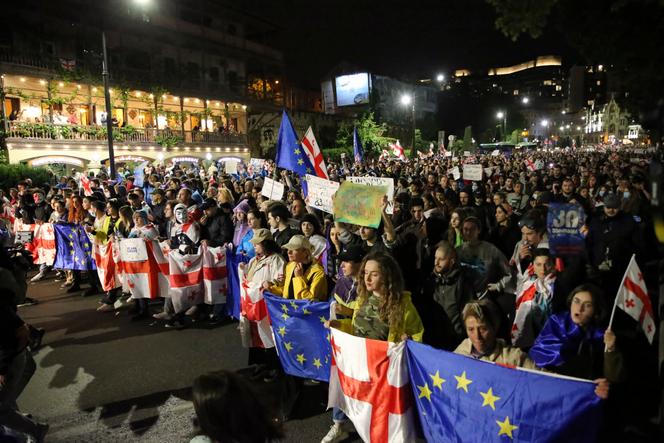


As they have done every evening for the past three weeks, thousands of people marched through central Tbilisi on the evening of Friday, May 3, in protest against the "foreign influence" bill, its second reading passed by the Georgian parliament on Wednesday. "No to the Russian law!" "Europe is the only path to civilization!" chanted the demonstrators. They had gathered in the early evening in Liberty Square, opposite the Paragraph Hotel, one of the properties belonging to the billionaire Bidzina Ivanishvili, founder and current leader of Georgian Dream, the party in power in Georgia for nearly 12 years.
Described as a "Russian law" by its critics, the text is similar to one adopted by the Duma in 2012 to muzzle opposition to Vladimir Putin's regime. In Georgia, as in Russia, the law requires independent media and civil society organizations to register as entities "pursuing the interests of a foreign power" if they receive more than 20% of their funding from abroad.
"To be labeled a 'foreign agent' in your own country is humiliating, it's tantamount to making traitors of us all," lamented Kety Gujaraidze, an environmental specialist with local NGO Green Alternative. For the past three weeks, this 52-year-old activist has been at every rally, believing that the future of her country is currently playing out in the streets of Tbilisi. "In 2008, Russia invaded us, it was the enemy, and it was simple. Today, we're under attack from our own government, which is seeking to muzzle civil society and cut us off from the European Union. We're not going to stand idly by," she vowed.
Youth is the driving force behind the protest. Georgian flag on their shoulders, Nia, Salomé, Tengo, and Nodariko – students and high-school pupils – feel little attraction to the Russian model. "Our government is subservient to Moscow, not us. We feel European," said Salome Aladashvili, a 16-year-old high school student. "We're going to keep on going until the law is withdrawn, we're not afraid!" exclaimed her classmate, Nia Khourstsilava, 15. This law, she said, "shatters the country's European dream" and "compromises the future" of young people. In what way? "All areas will be affected – the media, NGOs, education. Particularly those organizations that provide student exchanges, for example under the Erasmus program. Our relations with the European Union are going to get weaker, that's what the government wants."
While out in protest, young people are nevertheless not very politicized. "Most young people don't vote," pointed out Zurab Japaridze, 48, chair of the Girchi party ("more freedom" in Georgian, a liberal opposition party), founded in 2020. He is sure that "thanks to this protest movement, they will have to organize themselves." The moment of truth will come on May 13, when MPs, currently on vacation due to Orthodox Easter, will examine the law in its third and final reading. "If the law is passed, NGOs will not register. The government wants us to believe that this text is not intrusive, but we can't believe them. In Russia, when the law was passed in 2012, leaders spoke of a mere formality, but, right now, Russian activists are being thrown in jail as agents of foreign countries."
You have 41.13% of this article left to read. The rest is for subscribers only.
